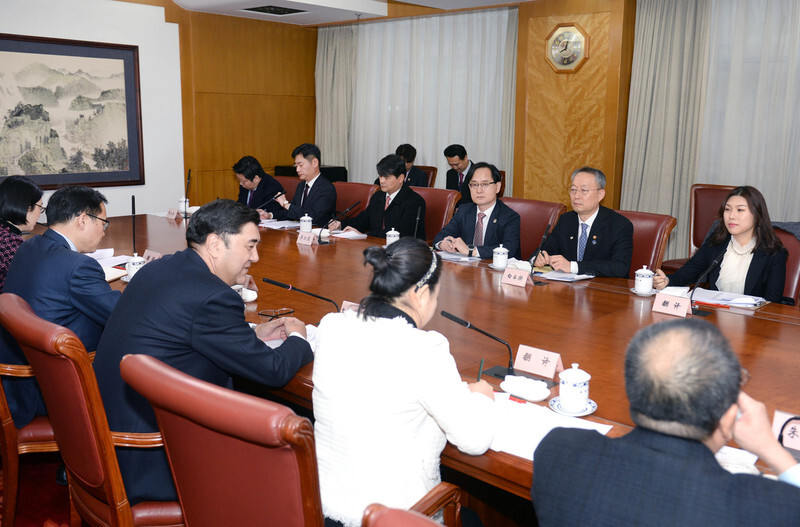hankyoreh
Links to other country sites 다른 나라 사이트 링크
South Korea and China hasten joint efforts toward Northeast Asian supergrid

South Korea and China plan to hasten their joint research efforts toward connecting their power grids as the first stage in a “Northeast Asian supergrid.”
The Northeast Asian supergrid vision involves linking China with the power grids of South Korea and Japan, which are currently disconnected from the Asian mainland, to allow supplies of electricity produced through China and Mongolia’s abundant renewable energy sources. The current target is to begin construction on a portion of the system by 2022.
The South Korean Ministry of Trade, Industry and Energy (MOTIE) held an inaugural South Korea-China energy council meeting on May 29 with the National Energy Administration (NEA), a Cabinet-level Chinese agency in charge of energy, at Lotte Hotel Seoul. At the meeting, the two sides pledged to cooperate in the areas of electricity, gas, and new and renewable energies. At a summit last December, the two sides agreed to establish a bureau director-level government-civilian energy cooperation channel between MOTIE and the NEA.
In their May 29 meeting, they established plans for active support on analyzing technical and economic feasibility – including the technology, costs, and locations to build an ocean-floor power network for the supergrid – and the completion of joint research within the year.
In the area of liquefied natural gas (LNG), the two sides fine-tuned the final draft of a memorandum of understanding on natural gas cooperation with the Japanese government as agreed upon at a trilateral summit last month. Respectively the world’s second- and third-ranked importers of natural gas, China and South Korea agreed to cooperation on boosting transparency and liquidity in the global natural gas market, which is currently disadvantageous to importers.
Their plans include addressing destination clauses that bar the sale of unconsumed volumes to other countries and contractual conditions that prevent adjustments to purchase volumes, while promoting “LNG swaps” in cases where crisis situations result in unstable LNG supplies. In terms of new and renewable energies, they agreed to examine measures for policy-sharing and joint research on major issues.
By Cho Kye-wan, staff reporters
Please direct comments or questions to [english@hani.co.kr]

Editorial・opinion
![[Column] Park Geun-hye déjà vu in Yoon Suk-yeol [Column] Park Geun-hye déjà vu in Yoon Suk-yeol](https://flexible.img.hani.co.kr/flexible/normal/500/300/imgdb/original/2024/0424/651713945113788.jpg) [Column] Park Geun-hye déjà vu in Yoon Suk-yeol
[Column] Park Geun-hye déjà vu in Yoon Suk-yeol![[Editorial] New weight of N. Korea’s nuclear threats makes dialogue all the more urgent [Editorial] New weight of N. Korea’s nuclear threats makes dialogue all the more urgent](https://flexible.img.hani.co.kr/flexible/normal/500/300/imgdb/original/2024/0424/7317139454662664.jpg) [Editorial] New weight of N. Korea’s nuclear threats makes dialogue all the more urgent
[Editorial] New weight of N. Korea’s nuclear threats makes dialogue all the more urgent- [Guest essay] The real reason Korea’s new right wants to dub Rhee a founding father
- [Column] ‘Choson’: Is it time we start referring to N. Korea in its own terms?
- [Editorial] Japan’s rewriting of history with Korea has gone too far
- [Column] The president’s questionable capacity for dialogue
- [Column] Are chaebol firms just pizza pies for families to divvy up as they please?
- [Column] Has Korea, too, crossed the Rubicon on China?
- [Correspondent’s column] In Japan’s alliance with US, echoes of its past alliances with UK
- [Editorial] Does Yoon think the Korean public is wrong?
Most viewed articles
- 1‘We must say no’: Seoul defense chief on Korean, USFK involvement in hypothetical Taiwan crisis
- 2N. Korean delegation’s trip to Iran shows how Pyongyang is leveraging ties with Moscow
- 3‘Weddingflation’ breaks the bank for Korean couples-to-be
- 4Korea sees more deaths than births for 52nd consecutive month in February
- 546% of cases of violence against women in Korea perpetrated by intimate partner, study finds
- 6Will NewJeans end up collateral damage in internal feud at K-pop juggernaut Hybe?
- 7[Column] Park Geun-hye déjà vu in Yoon Suk-yeol
- 8[Editorial] New weight of N. Korea’s nuclear threats makes dialogue all the more urgent
- 9Amnesty notes ‘erosion’ of freedom of expression in Korea in annual human rights report
- 10“Parental care contracts” increasingly common in South Korea